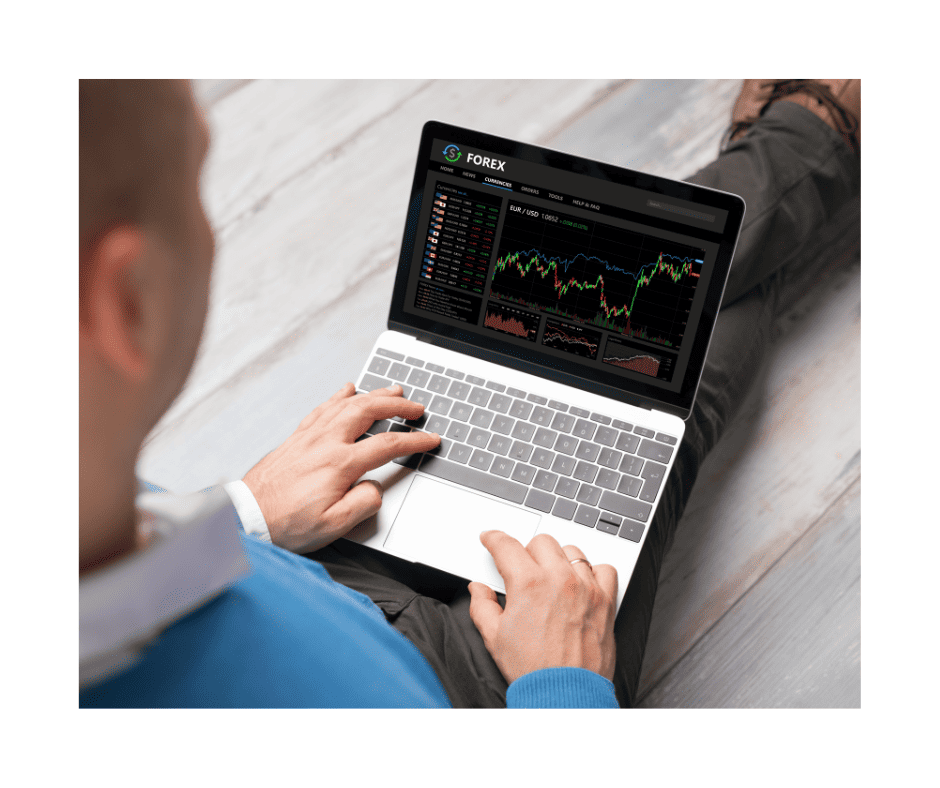Avoiding mistakes in Forex trading is essential for traders looking to succeed consistently.
Many people jump into Forex trading without fully understanding the intricacies, leading to costly mistakes.
In this article, we’ll explore some common pitfalls and provide valuable insights on how to avoid them, helping you become a more successful Forex trader.
Can Education Help Avoid Mistakes in Forex Trading?
Lack of education is a significant stumbling block for many aspiring Forex traders.
Study Forex
Begin your Forex trading journey by immersing yourself in educational resources.
Books, online courses, and reputable websites offer Forex basics, trading strategies, and market analysis information.
Start with the fundamentals, such as how currency pairs work, the mechanics of trading, and the factors influencing currency prices.
Practice with a Demo Account
Learning by doing is a crucial aspect of Forex education.
Fortunately, most Forex brokers provide demo accounts that allow you to simulate actual trading without risking your capital.
This invaluable tool lets you apply your theoretical knowledge in a practical setting, helping you gain confidence and refine your skills.

Continuous Learning
To stay ahead of the curve, make learning a continuous process. Follow financial news, economic indicators, and global events that can impact the Forex market.
This ongoing education will help you adapt to evolving market conditions and make informed decisions.
Technical and Fundamental Analysis
Understanding how to analyze the Forex market is essential for success.
Learn about technical analysis, which involves studying historical price charts and patterns, and fundamental analysis, which focuses on economic indicators, interest rates, and geopolitical factors.
A combination of both approaches can provide a well-rounded perspective on the market.
Seek Guidance
Feel free to seek guidance from experienced traders or mentors.
Join online forums or communities where traders share insights and experiences.
Discussions and asking questions can help you gain valuable insights and avoid common pitfalls.
Develop a Trading Plan
A trading plan is your roadmap to success.
It should outline your trading goals, risk tolerance, entry and exit strategies, and position sizing.
A well-thought-out trading plan serves as a guide that keeps you on track and prevents impulsive decisions.
By dedicating time to educating yourself about Forex trading and following these guidelines, you’ll build a strong foundation for your trading journey.
Remember that trading is not a get-rich-quick scheme but a skill that requires continuous improvement and discipline.

Is Neglecting Risk Management a Cause of Mistakes in Forex Trading?
Neglecting risk management is a grave error that can quickly erode your capital in Forex trading.
The allure of potential profits can blind you to the importance of protecting your capital.
To safeguard your trading capital, implement effective risk management strategies.
Set Stop-Loss Levels
Stop-losses are one of the most powerful tools in your arsenal.
These orders allow you to specify a price level at which you will close your trade to limit your losses.
Always use stop-losses when entering a trade, as they act as a safety net and prevent your losses from spiraling out of control.
Proper Position Sizing
Determining the appropriate position size for your trades is a critical aspect of risk management.
Never risk more than you can afford to lose on a single trade.
A common rule of thumb is to risk 1-2 % of your trading capital on any given trade.
This conservative approach helps protect your account from significant drawdowns.
Diversify Your Portfolio
Putting all your capital into a single trade or currency pair is a recipe for disaster.
Diversification involves spreading your trades across different currency pairs.
By diversifying your portfolio, you reduce the impact of a single losing trade on your overall account balance.

Leverage Wisely
Forex brokers often offer high leverage, amplifying profits and losses.
Leverage is a double-edged sword, and it’s crucial to use it wisely.
Avoid overleveraging, as it can lead to margin calls and wipe out your account if the market moves against you.
I recommend using no more than 10:1 leverage.
Be aware of the risks associated with the level of leverage you choose.
Risk-Reward Ratio
Before entering a trade, always consider the risk-reward ratio.
This ratio measures the potential profit against the potential loss for a trade.
A favorable risk-reward ratio typically involves aiming for more significant profits than the potential loss.
This practice ensures that your winning trades can compensate for your losing ones over time.
Regularly Review and Adjust
Risk management is not a one-time task; it requires ongoing assessment and adjustment.
Periodically review your trading plan and risk management strategies.
As your account balance grows or market conditions change, you may need to adapt your risk parameters accordingly.
Embrace Losses as Part of the Process
Accept that losses are an inevitable part of Forex trading.
Avoid chasing losses by increasing your position size or taking impulsive trades to recover.
A well-structured risk management plan should prevent significant losses from devastating your trading account.
In the world of Forex trading, protecting your capital is paramount.
Neglecting risk management can lead to disastrous outcomes, while a disciplined approach can help you weather market turbulence and achieve consistent long-term success.
Remember that preserving your capital is the foundation for profitable trading.

Why Ignoring Fundamental Analysis Leads to Mistakes in Forex Trading
Ignoring fundamental analysis is another common mistake many Forex traders make, especially those who rely solely on technical analysis.
While technical analysis is valuable for understanding price movements and patterns, fundamental analysis provides crucial insights into the underlying forces that drive currency markets.
Neglecting fundamental analysis can leave traders uninformed and ill-prepared for market shifts.
Stay Informed
Fundamental analysis revolves around understanding economic and geopolitical events and their potential impact on currency values.
Make it a habit to stay informed about global news, central bank policies, and significant geopolitical developments that can affect the Forex market.
Economic Indicators
A key component of fundamental analysis is interpreting economic indicators.
These indicators, such as Gross Domestic Product (GDP), inflation rates, unemployment figures, and consumer sentiment, offer valuable data for gauging a country’s economic health.
Familiarize yourself with these indicators and their implications on currency movements.
Interest Rates
Interest rates have a profound influence on currency values.
Central banks use interest rate policies to control inflation and stimulate or slow down economic growth.
Understanding how changes in interest rates can impact currency pairs is essential for any Forex trader.
Central Bank Policies
Central banks play a significant role in shaping a country’s economic landscape.
Pay attention to central bank decisions, statements, and policy changes.
For instance, the Federal Reserve’s monetary policy decisions can significantly affect the US dollar (USD) value and its currency pairs.

Geopolitical Events
Geopolitical events, such as elections, trade disputes, and conflicts, can create uncertainty in the Forex market.
Be aware of how these events can lead to sudden market volatility and influence currency prices.
Correlations
Fundamental analysis can also help you identify correlations between economic events and currency movements.
For example, robust employment data may strengthen the domestic currency, while political instability can weaken it.
Combine Technical and Fundamental Analysis
Successful traders often use both technical and fundamental analysis to make well-informed decisions.
While technical analysis focuses on price charts and patterns, fundamental analysis provides the “why” behind market movements.
Integrating these approaches can provide a more comprehensive view of the market.
Economic Calendars
Utilize economic calendars that track upcoming economic releases and events.
Plan your trades and stay prepared for potential market-moving announcements with the help of these calendars.
Incorporating fundamental analysis into your trading strategy gives you a more comprehensive understanding of the forces driving currency markets.
Successful trading involves a holistic approach, combining technical and fundamental analysis to stay ahead of market movements and make well-informed trading decisions.

Chasing Profits and Overtrading are Common Mistakes in Forex Trading
Chasing profits and overtrading are closely related mistakes that can spell disaster for Forex traders.
These behaviors often stem from impatience, greed, or the desire to recover losses quickly.
However, they can lead to exhaustion, emotional burnout, and significant financial losses.
Set Realistic Goals
One of the primary reasons traders fall into the trap of chasing profits is setting unrealistic expectations.
It’s essential to understand that Forex trading is not a guaranteed path to overnight riches.
Instead, view it as a long-term endeavor with the potential for consistent, sustainable gains.
Avoid Greed
Greed can cloud judgment and lead to reckless decision-making.
It’s tempting to keep a trade open to make even more money when it is profitable.
However, markets can reverse suddenly, turning a winning trade into a losing one.
Recognize the signs of greed and exercise discipline by sticking to your predefined profit-taking levels.
Embrace Consistency
Consistency is the hallmark of successful trading.
Rather than focusing on making large profits in a single trade, aim for steady, smaller gains over time.
This approach reduces the pressure to chase profits and helps you maintain a balanced and sustainable trading strategy.

Risk Management
Effective risk management plays a crucial role in curbing the impulse to overtrade.
By following strict position sizing and risk-reward ratios, you ensure that you don’t expose your account to excessive risk.
Avoid increasing your position size to recoup losses quickly, leading to overtrading.
Stick to a Trading Schedule
Overtrading often occurs when traders become too immersed in the markets and act impulsively outside their planned trading hours.
Create a structured trading schedule that aligns with your personal life and trading plan.
Stick to this schedule to avoid emotional decision-making during off-hours.
Trading Journal
Keeping a trading journal is a valuable tool for self-assessment and avoiding overtrading.
Document each trade, including your rationale, emotions, and the outcome.
Reviewing your journal can help you identify patterns of overtrading and make necessary adjustments to your trading habits.
Take Breaks
Forex markets operate 24/5, but that doesn’t mean you must trade continuously.
Taking regular breaks from trading can help refresh your perspective and prevent impulsive decisions.
Consider stepping away from the screens during high stress or when you feel the urge to overtrade.

Focus on Quality, Not Quantity
It’s a common misconception that more trades equals more profits.
Quality should always take precedence over quantity.
Analyze your trading strategy and focus on high-probability setups rather than engaging in excessive, low-confidence trades.
Mindset and Discipline
Developing a disciplined trading mindset is essential.
Remember that patience and adherence to your trading plan are your greatest allies in avoiding the pitfalls of chasing profits and overtrading.
Chasing profits and overtrading are common traps that can lead to significant losses and emotional burnout.
To avoid mistakes in Forex trading, focus on consistency, risk management, and discipline.
Conclusion
Forex trading offers an exciting opportunity to profit from the world’s largest financial market.
However, avoiding common mistakes is crucial for long-term success.
Educate yourself, manage risk, control your emotions, use technical and fundamental analysis, and avoid overtrading.
By following these guidelines, you can increase your chances of becoming a successful Forex trader and enjoy a rewarding journey in the Forex market.
What’s the Next Step?
Review your habits and trading practices and consider if you are making mistakes in these areas.
In addition, look for opportunities to incorporate these best practices in your trading.
Once you’re ready to trade, choose a strategy and process you believe will work for you.
If you need help developing an analysis process, you can use our Six Basics of Chart Analysis. If you’re unfamiliar with the Six Basics, you can learn them here for free.
The “Six Basics” will give you a strong foundation in chart analysis, which you can incorporate with what you’ve learned about avoiding mistakes in Forex trading.
In addition, when you get the “Six Basics,” you’ll also get Forex Forecast delivered to your inbox every Sunday.
Forex Forecast includes:
- Trade Ideas and Analysis
- I will show you the trade opportunities I’m watching using the Six Basics of Chart Analysis and Advanced Strategies.
- Case Studies from Around the Web
- Watch how applying the Six Basics worked on some of the best, most profitable trades.
- Trading Education Guides and Videos
- Want to learn most Six Basics techniques and advanced strategies?
- I produce Videos and Guides to help you learn and build a better trading practice.
- Links to New Articles
- I publish new articles on topics traders will want to know about every week, and you can find out when they post.
- Positionforex.com News
- Did something change at positionforex.com? Learn about it here first!
- Links to upcoming webinars
- Attend free webinars to improve your trading.
- And Much More
- Tools, Membership-only Videos, and more will be released in the Forex Forecast.
The best part – it’s completely free.

Frequently Asked Questions
What Is the Most Common Mistake That Beginner Forex Traders Make?
The most common mistake beginner Forex traders make is they need more education.
Many traders dive into Forex trading without fully understanding the basics, leading to costly errors.
To avoid this, studying Forex, using demo accounts, and learning about the market is crucial.
How Can I Protect My Trading Capital from Significant Losses in Forex Trading?
To protect your trading capital, implement effective risk management strategies.
Risk management includes setting stop-losses, proper position sizing, diversifying your portfolio, and being mindful of leverage.
These practices help limit potential losses and preserve your capital.
Why Is Fundamental Analysis Important in Forex Trading, and How Can I Incorporate It into My Strategy?
Fundamental analysis is crucial because it provides insights into the economic and geopolitical factors that influence currency markets.
To incorporate it into your strategy, stay informed about economic indicators, interest rates, central bank policies, and geopolitical events.
Combine fundamental analysis with technical analysis to make well-informed trading decisions.
What Are the Risks of Chasing Profits and Overtrading in Forex Trading?
Chasing profits and overtrading can lead to exhaustion, emotional burnout, and significant financial losses.
It often results from unrealistic profit expectations, greed, and impulsive decision-making.
To mitigate these risks, focus on realistic goals, consistency, disciplined risk management, and a structured trading schedule.
How Can I Avoid the Temptation of Overtrading and Maintain a Balanced Trading Approach?
To avoid overtrading, set achievable profit targets, exercise discipline, embrace consistency, and adhere to a well-structured trading plan.
Take regular breaks from trading to prevent impulsive decisions, and keep a trading journal to assess and adjust your trading habits.
Remember that quality trades are more important than quantity.

